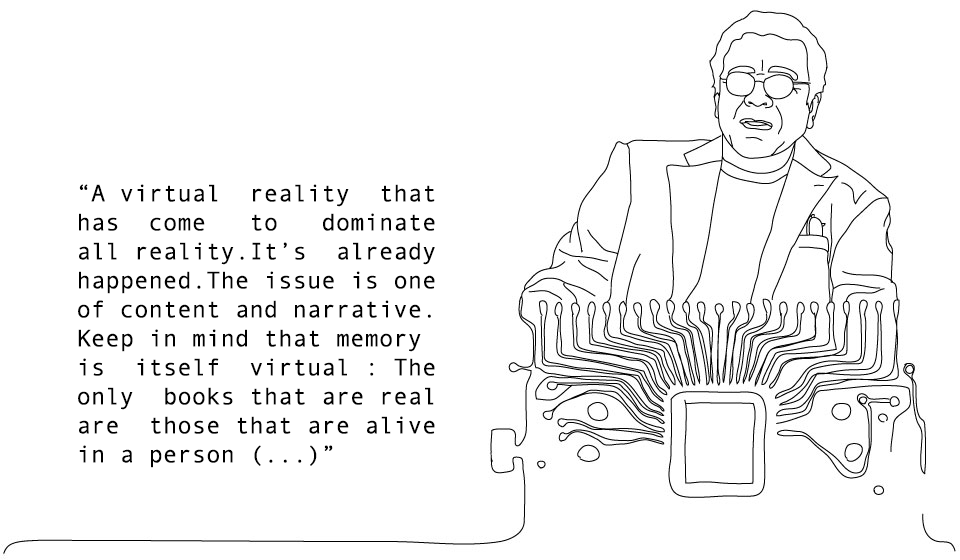INTERVIEW
Raphael Montañez Ortiz
by Felipe Meres
Illustration Paulo Mendel
After watching visual artist and professor Raphael Ortiz Ortiz flabbergast a highbrow audience at an Art Basel panel discussion in the end of last year. I became extremely interested in the ideas he shared and in the visions he so assuredly forecasted.
“The Future of the Museum” was the theme of the debate; asked about his thoughts on the subject. Ortiz promptly raised his iPhone and affirmed “this is it”. After heated arguments among the panelists and the audience, Ortiz made it clear he believed the future of the museum was no longer physical, but rather in the virtual world.
The internet. mobile phones and yet unveiled gadgets that’ll make use of holographic technologies: for the artist, these are the future museums.
I’ve had the opportunity to talk with Mr. Ortiz and get a glimpse of his extremely futuristic mindset.

Felipe Meres: I’d like to start this interview by asking you what’s your concept of a portable museum. Does it relate somehow to Duchamp’s concept?
Raphael Ortiz: No, it relates to the techno advancements presented in the movie I, Robot (Alex Proyas, 2004). Like when the holographic image of the scientist speaks to the policeman whose arm he had replaced with a robotic arm.

FM: What’s your thought on big institutions such as the Louvre. MoMA and Tate actually building new museums in different cities across the globe to showcase their collection? It’s like they’ve taken the hardest and longest road regarding the concept of ”portable museums”. is there really a need to go through all the hassle of physically creating new museums when there’s the internet and other virtual forms of doing that?
RO: PThink of them as deposits. like Egyptian tombs are warehouses of the Pharaoh’s treasure.
![]()
FM: At the panel at Art Basel about the Portable Museum when you affirmed you believe the future of exhibitions and museums is in cell phones it created a lot of estrangement from the audience. It seems people are so used to the excitement of being near an art piece and its aura, as W. Benjamin would say, that it is unimaginable for some of them to conceive a time when people visit exhibitions virtually. Why do you think that happens?
RO: Technophobia: Only the children. and those that cry lost in a tragic scene of a movie. understand the truth of the virtualness that all perception in fact is.

FM: Do you have any thoughts on how to change this scenario? Opinions on what should be done in order for people to drop their technophobia?
RO: How long did it take for the radio to be accepted. and the telephone. and the automobile. etc., etc.. etc. It will happen when Hollywood goes beyond 3D to a Holographic reality.

FM: People are still too attached to the physicality of objects. We’re currently undergoing massive changes regarding this. specially when it comes to printed material. Although people love the practicality of carrying all their library inside a convenient gadget such as Amazon’s Kindle, they’re not ready yet to get rid of their bookshelves and ever growing book collection. They still want to touch, sense. see their personal libraries on their offices and living rooms and also be able to show it to friends and family. Do you think this situation is temporary?
RO: Keep in mind that just as money became digital and therefore virtual. within the world of banking and investment, despite the distrust of banks and the stock market we have arrived within the digital age where banking and the stock market. itself are virtual realities… Soon Art and Artists and audience like the framed pictures in the Harry Potter movies will have consciousness that extends beyond the virtualness of the holographic and enter the frame as in the movie Pleasantville (Gary Ross, 1998).

FM: Also at the Art Basel conversation. you mentioned how our lives are already mostly virtual – since we spend hours in front of computers and television screens. staring at our mobile phones and at least 30% of our days sleeping. Do you think people realize that? Do you think this virtual time is going to keep on increasing?
RO: God has. with our species (men) evolving. potential to virtualness in perception. and a consciousness of dreaming. (as there are) technologies evolving to meet that potential (to) become a virtual reality that has come to dominate all reality… It’s already happened. The issue is one of content and narrative. Keep in mind that memory is. itself. virtual. The only books that are real are those that are alive in a person (who’s read them) – in fact like in the movie Fahrenheit 451 (François Truffaut, 1966).Faith is possible only to the extent that one can be in virtualness as a reality. that dominates all perception.

FM: I often hear people say they wish their kids would actually be out playing baseball and tennis in a park instead of doing it through their Wii’s console. Even though they’re still getting their exercise done. since it’s through the help of a virtual game. it seems it’s not “good enough” or even “real”. Parents want their kids to feel the earth on their feet. see trees and animals and enjoy the sun. Do you think this is just an anachronistic and romantic point of view that should be discarded or is it a valid preoccupation?
RO: When in virtualness we develop mind over matter as in the movie Forbidden Planet (Fred M. Wilcox, 1956). As when mind and body are all mind. This question is moot…


